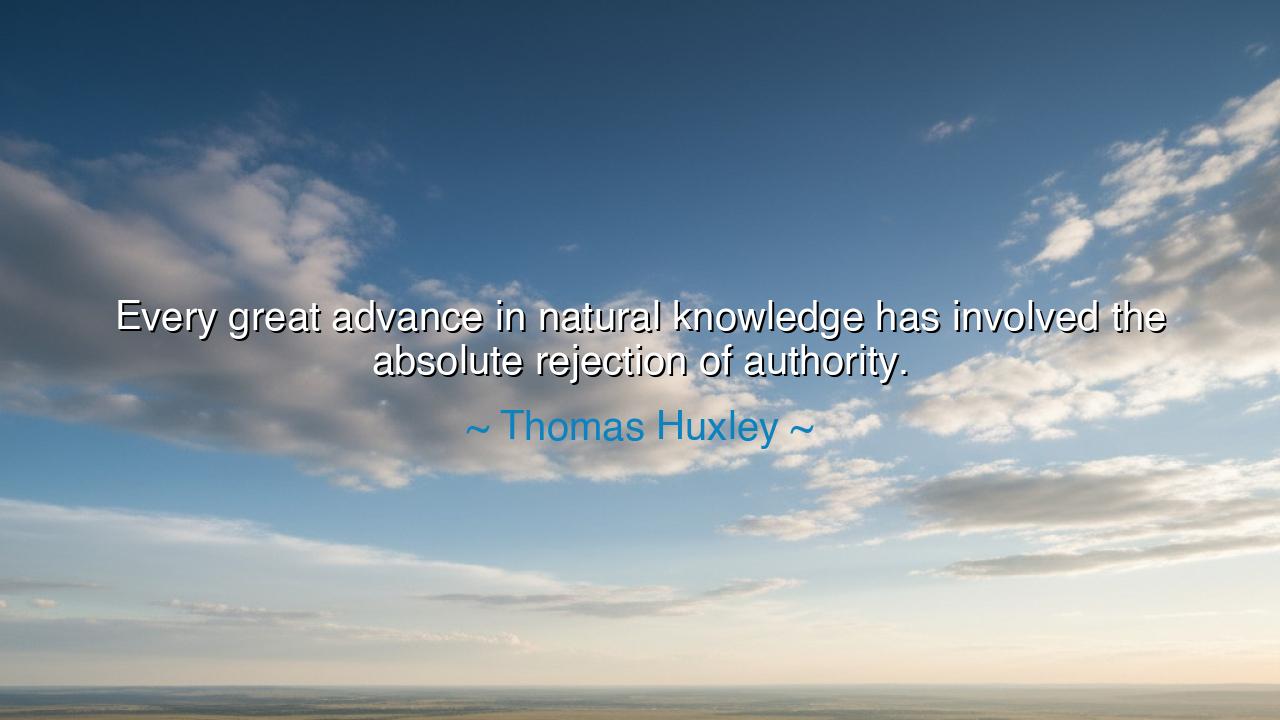
Every great advance in natural knowledge has involved the
Every great advance in natural knowledge has involved the absolute rejection of authority.






Hear the voice of Thomas Huxley, defender of Darwin and champion of the restless mind, who declared: “Every great advance in natural knowledge has involved the absolute rejection of authority.” In this fierce saying is a truth as eternal as the stars—that progress in knowledge comes not from bowing to the decrees of the powerful, but from daring to question them. Authority seeks to bind truth in chains, to guard it in temples and halls, but the seeker of wisdom must break these chains, casting aside fear, and walk boldly into the unknown. For the laws of nature do not bend to kings, nor priests, nor councils—they reveal themselves only to those who will not be silenced.
From the dawn of human history, this struggle has repeated itself. When Galileo raised his telescope to the heavens, he saw the moons of Jupiter circling not the earth, but another world. This discovery shattered the old order, which had long proclaimed the earth the unmoving center of creation. The authorities of his time branded him a heretic, demanded his silence, and forced him to recant. Yet his vision could not be un-seen, his truth could not be buried. Here Huxley’s words find flesh: the advance of natural knowledge required the rejection of the authority of church and tradition, and the triumph of observation over obedience.
So too with Charles Darwin, whose theory of evolution by natural selection tore away the veil of comforting myths and revealed a world governed by slow, relentless change. Many rejected him, clinging to old authorities that denied his conclusions. Yet the evidence of nature was too vast, too undeniable. It was Huxley himself, Darwin’s “bulldog,” who defended this truth with fiery zeal, proclaiming that authority must yield when the facts of the earth and heavens cry otherwise. The advance of knowledge demanded courage to face ridicule, to oppose power, and to embrace truth no matter how unsettling.
And what of the world before these men? When medicine was ruled by superstition, when illness was explained by curses and humors, it took bold souls like William Harvey, who revealed the circulation of blood, to defy centuries of blind tradition. When chemistry was still alchemy, clinging to mystical authorities, it took men like Antoine Lavoisier, who through experiment and reason laid the foundation of modern science. Each step forward came only when the old masters were set aside, when the seeker declared: “I will not accept this because it is spoken by authority—I will test it, I will see for myself.”
The deeper wisdom of Huxley’s words is this: knowledge is not a gift handed down by the powerful, but a treasure wrested from the unknown by the courageous. Authority seeks permanence, but truth is restless; authority demands obedience, but truth demands inquiry. Thus, every age that has advanced has done so not by honoring authority, but by rejecting it where it stifles discovery. The loyalty of the true seeker must always be to evidence, to reason, to the unfolding revelation of nature itself.
The lesson, then, is clear: question boldly. Respect teachers, but do not idolize them. Honor tradition, but do not be imprisoned by it. When you seek knowledge, do not ask, “Who has spoken this?” but “What is the evidence for it?” For the path to wisdom is not paved with obedience, but with inquiry, experiment, and courage. To cling blindly to authority is to halt the march of truth; to challenge it is to join the great procession of those who moved humanity forward.
Practical action flows from this wisdom: in your studies, in your work, in your daily life, test what you are told. Do not fear to ask questions, even when they disturb. Read widely, think deeply, and let reason be your guide. In the face of authority, if it stands against truth, stand firm as Galileo, as Darwin, as all who have lifted humanity by daring to say, “I do not accept—until I see the proof.”
So remember always Huxley’s wisdom: every great advance in natural knowledge requires the rejection of authority. For truth does not kneel to power. It waits for the brave, the curious, the unyielding, who will cast aside fear of man to listen instead to the voice of nature. Be among them, and you shall not merely learn—you shall help lead humanity forward.






AAdministratorAdministrator
Welcome, honored guests. Please leave a comment, we will respond soon